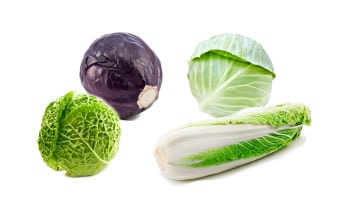
Written By: Sofia Layarda, MPH
Title: Master of Public Health
Alumni: University of California, Berkeley
Last Updated on:

This month we celebrate an often overlooked nutritional superstar: cabbage. Most of us associate cabbage with the round, waxy, light-green or purplish “heads” in the grocery store (or the pale shredded bits you see in bagged coleslaw mix). In fact, there are many varieties of cabbage available with differing shapes and colors. For example, savoy cabbage has curly leaves. And two Asian varieties – Napa and Bok Choy – are not round at all, but have elongated shapes with definite leafy parts. Cabbage belongs to the cruciferous family of vegetables, which includes kale, broccoli, brussels sprouts, and cauliflower. Cabbage is popular around the world, often showing up as a pickled or fermented dish (such as the German sauerkraut or the Korean kimchi).
Table of Contents

The cruciferous family of vegetables collectively have a stellar nutritional reputation, and cabbage is no exception. Cabbage is rich in Vitamin C and several of the B Vitamins, and is a good source of fiber. In addition, cabbage contains compounds called glucosinolates, which are powerful cancer-fighting agents. Glucosinolates break down into phytonutrients called indoles and sulforaphane and, in various studies, they have appeared to optimize the action of enzymes involved in detoxification. Research has shown lower risk of certain types of cancers among populations that regularly consume cabbage, and the effect is noticeable at 3 to 5 cups (servings) per week.
When buying cabbage, look for whole “heads” that are heavy for their size, without bruises or soft spots. Cabbage is generally a sturdy vegetable and will keep for up to a couple of weeks in the refrigerator. If the cabbage has been wrapped in plastic, poke a few air holes to prevent excess moisture buildup. Shredded cabbage won’t keep as well, so use it up before the expiry date on the bag. In fact, once cabbage is cut, the Vitamin C content starts to decline, so don’t wait too long to use it up.
Alumni: University of California, Berkeley – Sofia believes in bringing back fun and pleasure into everyday eating. She loves cooking, and is constantly experimenting with ingredients, creating recipes and trying them out on family and friends. Her latest interest lies in finding realistic and practical ways of environmentally-friendly food/eating habits.
cabbage, cancer diet, fiber, glucosinolates, grocery aisle, healthy every month, vegetables